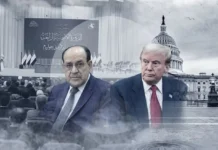Tishwash: The Association of Private Banks to Nina: Iraq has made significant progress in promoting financial inclusion…and these are the requirements for the success of international standards.
The Iraqi Private Banks Association confirmed: “Iraq has achieved significant progress in financial inclusion thanks to the Central Bank’s commitment to implementing international standards.”
The head of the association, Wadih Al-Handhal, said in a statement to the National Iraqi News Agency ( NINA ), that “the Central Bank of Iraq is moving forward in implementing compliance standards and enhancing financial inclusion in the banking sector, and the Banks Association also supports raising awareness of financial inclusion.”
He explained that “the success of the basic requirements for implementing these standards and achieving advanced levels in combating money laundering depend on training specialized and qualified staff to use information and databases, based on the principle of knowing the customer and the sources of his funds.”
He added: “The Middle East and North Africa Financial Action Task Force (MENAFATF) has transformed Iraq from a gray zone to a monitoring area, and this is true evidence that Iraq has achieved significant progress in enhancing financial inclusion and combating money laundering and terrorist financing,” noting that “the need for legal legislation still exists, and we must move forward in training human cadres to keep pace with the rapid digital and technological transformation in the world.”
Regarding the financial inclusion rates achieved by Iraq, Al-Handhal explained that, “according to international standards, the current financial inclusion rate in Iraq has exceeded 46% compared to previous years, which is a very significant progress with which we seek to achieve a rate of 90-95% in cooperation with the Central Bank in the near future. The Arab Monetary Fund is also very satisfied with this rate and is following the growth of the banking sector. It considers Iraq to be implementing financial inclusion through a sound mechanism that has contributed to Iraq’s progress in ranking ahead of other countries.” link
************
Tishwash: Government advisor: The government has succeeded in managing fiscal policy.
The Prime Minister’s financial advisor, Mazhar Mohammed Salih, explained on Friday the reasons for the delay in submitting the budget schedules, while stressing that the government has succeeded in managing the country’s financial and economic policy.
Saleh said, “The financial compass reading, which required the submission of the 2025 budget tables for legal approval under Article 77/Second of the Budget Law, was truly delayed for two fundamental reasons. The first was to await the amendment to the three-year general budget law regarding the value of the region’s oil contracts and the costs of transporting its oil, which were not approved until last February. The other reason relates to the fluctuations that global energy markets were exposed to and the effects of global oil prices on the general budget, which also required rereading some financial constants and variables, whether revenues, expenditures, deficit financing and its sources, more than once due to international geopolitical and economic problems and the major issues that occurred in the global economy at a rapid pace, which led to the generation of volatile shocks in close periods of the current fiscal year, which necessitated hedging against external shocks.”
He added that “all these factors led to the delay in submitting budget schedules to review some of its inputs and outputs,” noting that “there is significant and ongoing cooperation between the legislative and executive authorities in monitoring and managing the country’s financial affairs, with understanding, interaction, and optimization of great importance to ensuring the economic stability the country is experiencing.”
Regarding the impact of delayed budget schedules on projects included in the investment section, Saleh pointed out that, “Based on the Federal General Budget Law No. 13 of 2023, the three-year budget, the federal financial policy was formed based on an approach called ‘fiscal space’, which gave it the high capacity to move dozens of approved and previously suspended strategic government projects forward into implementation.
This is what distinguished it with a highly active development wheel in implementing service projects that the country is witnessing without interruption, and its results have become tangible thanks to the success of the three-year budget, in addition to the major projects approved in the 2023 and 2024 budget schedules, which are currently ongoing without interruption.”
He stressed that “the state’s investment approach is proceeding in line with the sustainability of economic development and in accordance with the high positive results currently achieved in growth rates and the great economic stability that the country is witnessing, whether in terms of declining unemployment rates, increasing economic growth, and price stability, in an active and compatible trilogy achieved as a result of the success of the country’s financial and economic policy without interruption in the wheels of public spending, including the current year 2025.”
He continued, “As far as the rights and entitlements acquired in the operational aspect of the general budget are concerned, but have not been disbursed and are contingent upon the submission of the 2025 financial schedules, these are legally protected rights reserved for their beneficiaries and are not subject to statute of limitations. They are merely a matter of timing and will be disbursed upon the approval of these schedules or any adjustment that does not conflict with the law.” link
************
Tishwash: The US Treasury is pursuing corruption funds… and the Baghdad government remains silent.
An Imminent Crisis in the Iraqi Financial Sector: Has the Phase of Comprehensive Sanctions Begun?
Iraq’s financial system is facing new signs of turmoil after the disruption of salary payments through some electronic payment companies affiliated with government institutions. While the reasons for the disruption appear technical, informed sources confirm that the matter is linked to US investigations targeting Iraqi banks and companies suspected of involvement in money laundering operations abroad, to countries including Turkey, Iran, and the UAE.
The same sources explained that the US Treasury had granted a grace period to a number of private banks and electronic payment companies to rectify their status and comply with international standards for combating money laundering and terrorist financing, including the Financial Action Task Force (FATF) and Know Your Customer (KYC) requirements. However, many of these entities have not demonstrated sufficient seriousness in resolving their cases, opening the door to the inclusion of new names on US sanctions lists in the near future.
This situation threatens to directly disrupt the financial market’s performance, especially if the sanctions affect active institutions relied upon to pay salaries and finance daily commercial activities. Experts expect liquidity within the market to be significantly affected, amid growing concerns about declining public confidence in local banks.
This is particularly true with the increased demand for dollars for external transfers or for storage in anticipation of any unexpected developments. This pressure could lead to a decline in the value of the Iraqi dinar and a rise in the dollar on the parallel market, which would impact the prices of goods and services in an already tense economic environment.
Meanwhile, regulatory authorities within Iraq , led by the Central Bank, are preparing to impose stricter oversight on the activities of banks and money transfer companies in an attempt to avoid further escalation. This is particularly true since some technical reports have revealed clear violations in the performance of some banking institutions, including massive financial transfers abroad without legal documentation, the issuance of credit cards to fictitious accounts, and suspicions of financing prohibited activities or smuggling hard currency.
Despite the bleak outlook, observers believe the crisis could mark a turning point in Iraq’s financial reform process. It has become imperative to restructure the private banking sector and impose strict regulatory classifications, along with a comprehensive review of electronic payment companies to ensure their compliance with international standards, and to open the door to broader partnerships with globally licensed financial service providers.
In this context, the crisis may turn into an opportunity to reshape the financial market in Iraq, starting with cleansing the banking environment of unregulated entities and bolstering international institutions’ confidence in the Iraqi transfer and oversight system. The shift toward a more transparent and governed environment is not a luxury, but rather a necessity imposed by both domestic realities and international pressures.
Iraq today stands at a critical crossroads: either integrate into the global financial system on its terms and ensure gradual stability in its banking sector, or continue sliding toward financial isolation, which will have direct repercussions for the lives of citizens and the country’s economy as a whole. link





